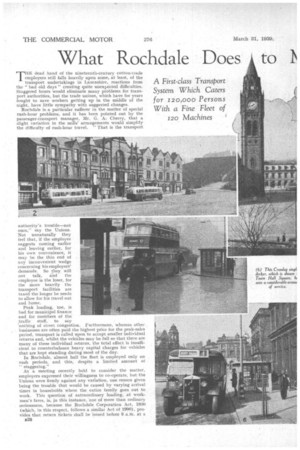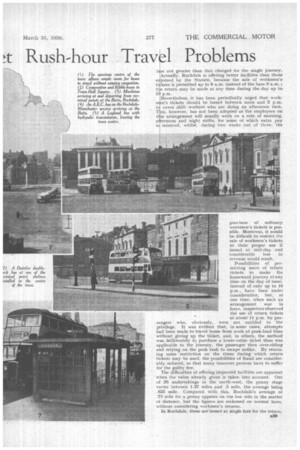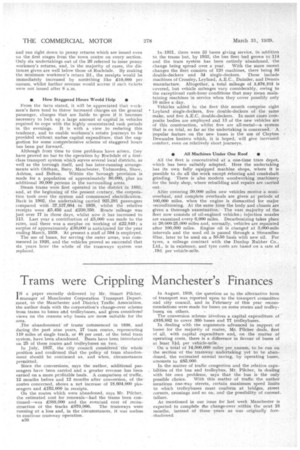What Rochdale Does to I■ ,t Rush-hour Travel Problems
Page 106

Page 107

Page 108

If you've noticed an error in this article please click here to report it so we can fix it.
THE dead hand of the nineteenth-century cotton-trade employers still falls heavily upon some, at least, of the transport undertakings in Lancashire, reactions from the " bad old days " creating quite unexpected difficulties. Staggered hours would eliminate many problems for transport authorities, but the trade unions, which have for years fought to save workers getting up in the middle of the night, have little sympathy with suggested changes.
Rochdale is a particular sufferer in the matter of special rush-hour problems, and it has been pointed out by the passenger-transport manager, Mr. G. A. Cherry, that a slight variation in the mills' arrangements would simplify the difficulty of rush-hour travel, " That is the transport
authority's trouble—not ours,say the Unions. Not unnaturally they feel that, if the employee suggests coming earlier and leaving earlier, for his own convenience, it may be the thin end of any inconvenient wedge concerning his employers' demands. So they will not talk, and the employee is the loser, for the more heavily the transport facilities are taxed the longer he needs to allow for his travel out and home.
Peak loading, too, is had for municipal finance and for members of the ;traffic staff, to say nothing of street congestion. Furthermore, whereas other businesses are often paid the highest price for the peak-sales period, transport is called upon to accept smaller individual returns and, whilst the vehicles may be full so that there are many, of these individual returns, the total effect is insufficient to counterbalance heavy capital charges for vehicles that are kept standing during most of the day.
In Rochdale, almost half the fleet is employed only on rush periods, and this, despite a limited amount of " staggering."
At a meeting recently held to consider the matter, employers expressed their willingness to co-operate, but the Unions were firmly against any variation, one reason given being the trouble that would be caused by varying arrival times in households where the entire family goes out to work. This question of extraordinary loading, at workmen's fares, is, in this instance, one of more than ordinary seriousness, because the Rochdale Corporation Act, 1930 (which, in this respect, follows a similar Act of 1900), provides that return tickets shall be issued before 8 a.m, at a B28 I re not greater than that charged for the single journey.
Actually, Rochdale is offering better facilities than those e joined by the Statute, because the sale of workmen's ti kets is permitted up to 9 a.m. instead of the bare 8 am.; ti e return may be made at any time during the day up to ii p.m.
Nevertheless, it has been periodically urged that workn's tickets should be issued between noon and 2 pan. t cover shift workerS who are doing an afternoon turn. T s is, however, has not been adopted as the employees on t is arrangement will usually work on a rota of morning, a ernoon and 'night shifts, for some of which extra pay is received, whilst, during two weeks out of three, the purchase of ordinary workmen's tickets is possible. Moreover, it would be difficult to restrict the sale of workmen's tickets to their proper use if issued at mid-day and considerable loss in revenue would result.
Possibilities of permitting users of return tickets to make the homeward journey at any time on the day of issue, instead of only up to 10 p.m., have been under consideration, but, at one time, when such an arrangement was in force, inspectors observed the use of return tickets at about 11 p.m. by passengers who, obviously, were not entitled to the privilege. It was evident that, in some cases, attempts had been made to travel home from work at peak-load time without giving up the ticket, and, in others, the method was deliberately to purchase a lower-value ticket than was applicable to the journey, the passenger then over-riding and relying on the peak rush to escape notice. By retaining some restriction on the times during which return tickets may be used, the possibilities of fraud are considerably reduced, so that many innocent persons have to suffer for the guilty few.
The difficulties of offering improved facilities are apparent when the value already given is taken into account. Out of 26 undertakings in the north-west, the penny stage varies between 1.27 miles and .5 mile, the average being .825 mile. Compared with this, Rochdale's average of .73 mile for a penny appears on the low side in the matter of distance, but the figures are reckoned on normal fares, without considering workmen's returns.
In Rochdale, these are issued at single fare for the return, B21k and run right down to penny returns which are issued even on the first stages from the town centre on every section. Only six undertakings out of the 26 referred to issue penny workmen's returns, and, in the majority of cases, the distances given are well below those of Rochdale. By making the minimum workmen's return 2c1., the receipts would be immediately increased by soffething like £10,000 per annum, whilst further revenue would accrue if such tickets were not issued after 8 a.m.
in. How Staggered Hours Would Help •
From the facts stated, it will he appreciated that workmen's fares tend to throw increased charges on the general passenger, charges •that are liable to -grow if it becomes necessary to lock up a large amount of capital in vehicles required to cope with the highly concentrated rush periods in the evenings. It is with a view to reducing this tendency, and to enable workmen's return journeys to be provided without undue capital expenditure; that the suggestion for some comprehensive scheme of staggered hours has beenput forward.
Although from time to time problems have arisen, they have proved no bar to the operation by Rochdale of a firstclass transport system which serves several local districts, as well as the borough itself, and has inter-running arrangements with Oldham, Bury, Manchester, Todmorden, Shaw, Ashton, and Bolton. Within the borough provision is made for a population of approximately 90,000, plus an additional 30,000 persons in the surrounding areas.
Steam trams were first operated in the district in 1883, and, at the beginning of the present century, the corporation took over the system and commenced electrification. Back in 1902, the undertaking carried 025,281 passengers compared with 37,137,684 in 1938, whilst the relative receipts were £5,456 and £230,350. Route mileage was just over 17 in those days, whilst now it has increased to 113. Last year a contribution of 25,000 was made to the rates, and there was a surplus on working of £22,849; a surplus of approximately £30,000 is anticipated for the year ending March, 1939. 'At present a staff of 504 is employed.
The use of buses, for serving the outer areas, was commenced in 1926, and the vehicles proved so successful that six years later the whale of the tramways system was replaced. In 1931, there were 33 buses giving service, in addition to the trams but, by 1933, the bus fleet had grown to 114 and the tram system has been entirely abandoned, the change being spread over, a year. With the more recent changes the fleet consists of 120 machines, there being 86 double-deckers and 34 single-deckers, These include machines of Crossley, Leyland, A.E.C., Daimler, and Dennis manufacture. Altogether, a total mileage of 3,870,315 is covered, but vehicle mileages vary considerably, owing to the exceptional rush-hour conditions that may mean maintaining machines in service when they cover possibly only 10 Miles a" day.
Vehicles added to the fleet this month comprise eight Leyland single-deckers, five double-deckers of the same make, and five A.E.C. double-deckers, In most cases 'composite bodies are employed and 13 of the new vehicles are of this construction, whilst five are ail-metal—a system that is on trial, so far as the undertaking is concerned. A popular feature on the new buses is the use of Clayton Dewanclre heaters which, it is hoped, will give increased comfort, even on relatively short journeys.
• All Machines Under One Roof • All the fleet is concentrated at a one-time tram depot, which has been suitably adapted. Here the undertaking has its own fully equipped machine shops, where it is possible to do all the work except reboring and crankshaft grinding. There is also modern woodworking machinery for the body shop, where rebuilding and repairs are carried out.
After covering 50,000 miles new vehicles receive a semi; overhaul, and complete overhauls are given at periods of 09,000 miles, when the engine is dismantled for major reconditioning. At the same time the body and chassis are given a thorough examination. The vast majority of the fleet now consists of oil-engined vehicles ; injection nozzles are examined every 6,000 miles. Decarbonizing takes place at 20,000-25,000 miles and, normally, vehicles are repainted after 100,000 miles. Engine oil is changed at 3,000-mile intervals and the used oil is passed through a Streamline filter, later to be used on a 50-50 basis with new oil. For tyres, a mileage contract with the Dunlop Rubber Co., Ltd., is in existence, and tyre costs are based on a rate of .19d, per vehicle-mile.
























































































































































